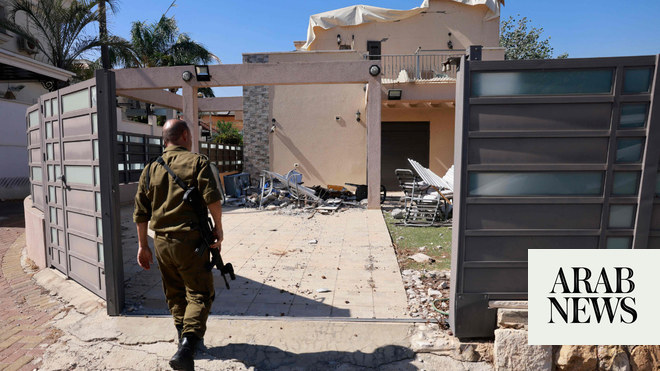GAZA: Gaza experienced its first day of relative peace in months on Sunday, after Israel’s military said it would “pause” daily fighting around the southern route to ease the flow of aid, following repeated UN warnings of famine in the Palestinian territory.
“Compared to previous days, today, the first day of Eid al-Adha, is considered almost peaceful and calm has reigned throughout Gaza,” Mahmoud Bassal, a spokesman for the Hamas-run Gaza Civil Defense Agency, told AFP. .
He said the exceptions included “some targets” in the Shujaya and Zeytun areas of Gaza City, as well as Israeli artillery fire in Rafah, in southern Gaza.
AFP correspondents in northern and central Gaza reported no fighting on Sunday morning, although they reported shelling and at least one attack in Rafah and an airstrike in central Gaza in the early evening.
In a statement, the army emphasized that “there was no cessation of hostilities in the southern Gaza Strip.”
The announcement of a “local, tactical pause in military activity” during daylight hours in the Rafah area came a day after eight Israeli soldiers were killed in an explosion near the city in the far south, and three more soldiers were killed elsewhere.
It was one of the biggest losses for the army in more than eight months of war against Hamas militants.
“Since this morning we felt a sudden calm, no shooting or bombing… It’s strange,” said Haitham Al-Ghura, 30, from Gaza City.
The United Nations welcomed Israel’s move, although “this has yet to translate into more aid reaching people in need,” said Jens Laerke, a spokesman for the UN aid agency OCHA.
He called for “further concrete measures by Israel to address the long-standing issues” of aid needs.
Laerke told AFP that Gazans “urgently need food, water, sanitation, shelter and health care, with many living near solid waste piles, which increases health risks.”
“We need to be able to safely deliver aid across Gaza,” he added.
The UN and humanitarian groups have repeatedly expressed alarm over severe shortages of food and other essentials in the Gaza Strip.
This has been exacerbated by restrictions on land access and the closure of the key Rafah crossing with Egypt since Israeli forces seized the Palestinian side in early May.
Israel has long defended its efforts to get aid into Gaza, including through the Kerem Shalom border near Rafah, blaming militants for looting supplies and aid workers for not distributing them to civilians.
A break “for humanitarian purposes will take place from 8:00 (05:00 GMT) to 19:00 (16:00 GMT) every day until further notice on the road leading from Kerem Shalom crossing to Salah Al-Din road and then north” , according to the military statement.
A map released by the military showed a declared humanitarian road extending to Rafah’s European Hospital, about 10 kilometers (six miles) from Kerem Shalom.
The announcement came as Muslims around the world mark Eid al-Adha, or the Feast of Sacrifice.
“This Eid is completely different,” said Umm Muhammad Al-Qatri in the Jabaliya refugee camp in northern Gaza.
“We lost a lot of people. There is a lot of destruction. We don’t have the joy we usually have,” she told AFP.
Instead of a happy holiday spirit, “I came to the Eid prayer sad. I lost my son.”
The military said the pause was already in place as part of efforts to “increase the volume of humanitarian assistance” following talks with the United Nations and other organizations.
The eight soldiers killed on Saturday were hit by an explosion while traveling in an armored vehicle near Rafah, the army said. The soldiers there fought fierce street battles against Palestinian militants.
Army spokesman Rear Admiral Daniel Hagary said the blast “appears to have been caused by an explosive device planted in the area or by the firing of an anti-tank missile.”
Separately, two soldiers were killed in fighting in northern Gaza, and another succumbed to wounds in recent fighting.
Abu Obaida, a spokesman for Hamas’ military wing, promised to “continue our painful strikes against the enemy wherever he is.”
The losses on Saturday brought the Israeli military’s total death toll to 309 since it began its ground offensive in Gaza on October 27.
Israeli Prime Minister Benjamin Netanyahu expressed his condolences after “this terrible loss” and said that “despite the great and disturbing cost, we must stick to the goals of the war.”
Israel has vowed to destroy Hamas after the Palestinian group’s unprecedented attack on October 7 left 1,194 people dead, most of them civilians, according to an AFP tally based on official Israeli figures.
Militants also captured 251 hostages. Of those, 116 remain in Gaza, although the military says 41 are dead.
Israel’s retaliatory offensive has killed at least 37,337 people in Gaza, also mostly civilians, according to the territory’s health ministry.
The latest death toll includes at least 41 deaths in the previous 24 hours, the statement said.
Egyptian, Qatari and American mediators have been pushing for a new truce in Gaza, so far without success.
The only previous truce lasted a week in November and led to the release of many hostages in exchange for Palestinian prisoners in Israeli jails, while increased aid flowed into Gaza.
Hamas has insisted on a complete withdrawal of Israeli forces from Gaza and a permanent ceasefire — demands that Israel has repeatedly rejected.
US Secretary of State Anthony Blinken said Israel supported the latest plan, but Netanyahu, whose far-right coalition partners strongly oppose the ceasefire, has not publicly endorsed it.
Israel’s hardline National Security Minister Itamar Ben Gvir said on Sunday that the humanitarian pause announced by the military was part of a “crazy and delusional approach”.
In early November, the United States announced that Israel had agreed to four-hour humanitarian breaks. One such break occurred on December 14, COGAT, the Israeli Defense Ministry body responsible for Palestinian civilian affairs, said at the time.

